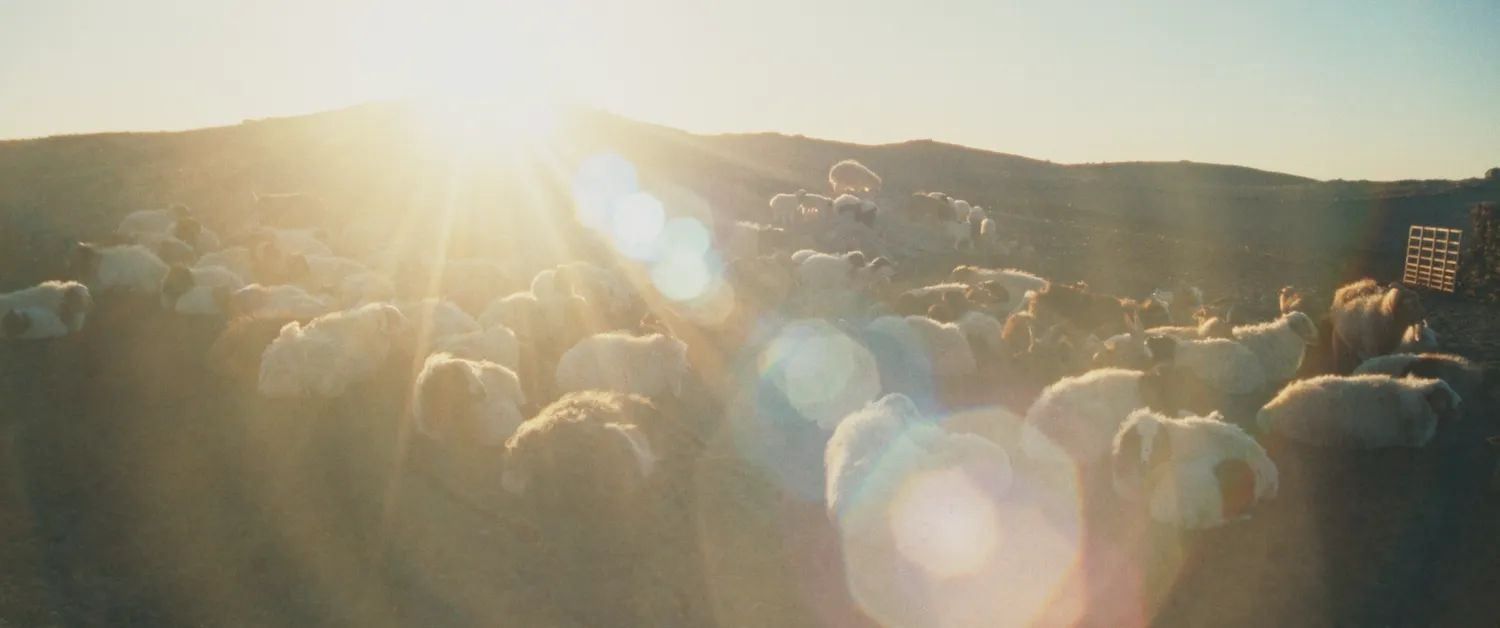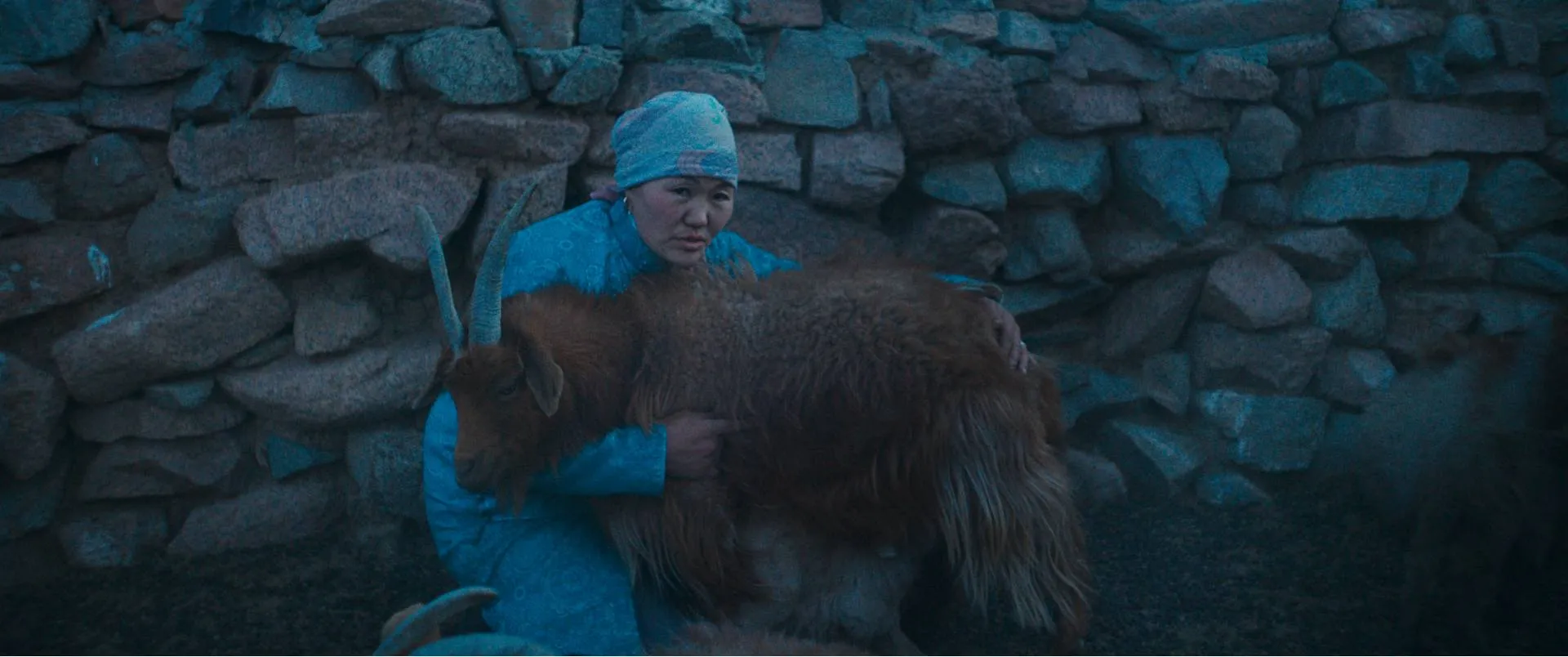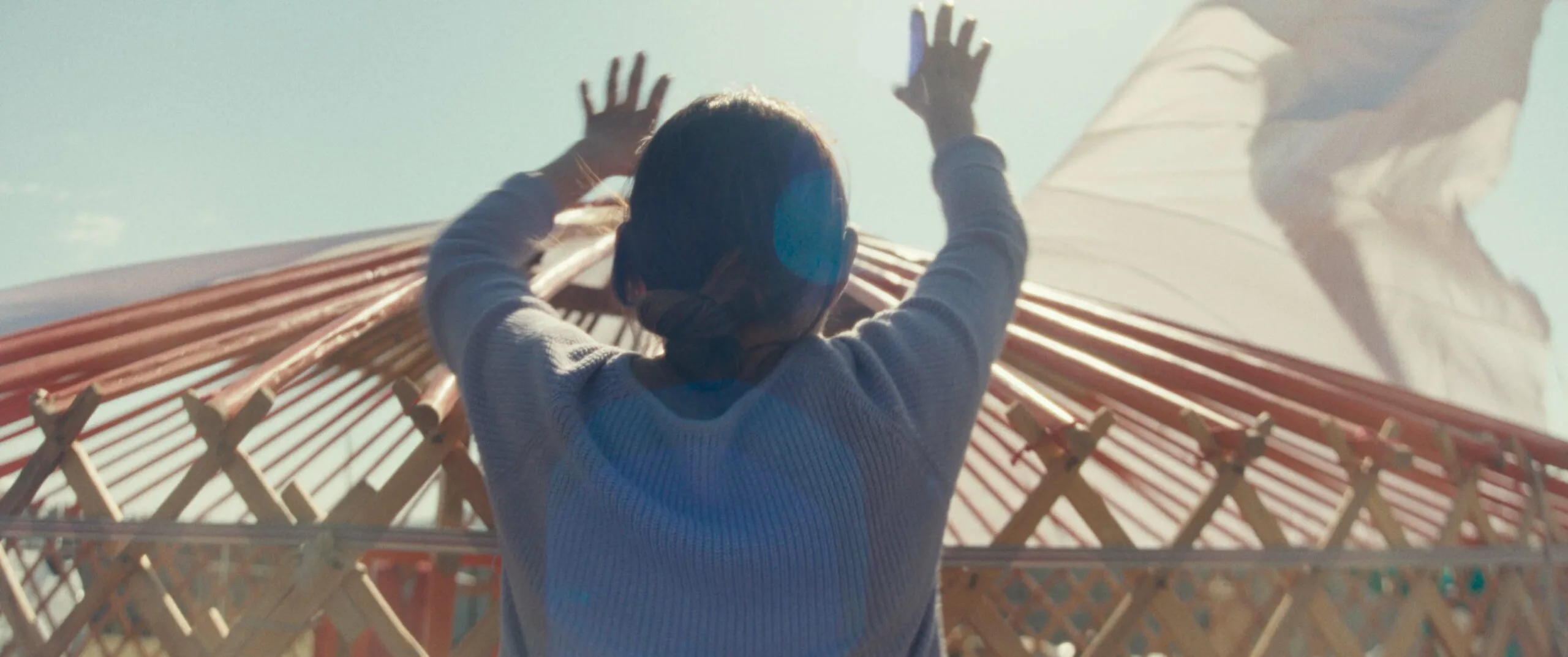The Wolves Always Come at Night by Gabrielle Brady is a moving docudrama that follows a Mongolian family dealing with the effects of climate change. The narrative follows Davaa and Zaya, whose pastoral existence is destroyed by the ferocious forces of nature—a sandstorm that destroys their livestock and way of life.
The existential struggle of humanity faced by an indifferent universe, where the very land that sustains life becomes a sign of despair, is depicted in this story, which is not just about survival.
Brady’s skill as an artist comes from how she skillfully blends documentary realism with scripted poignancy. This method makes it possible to show Davaa and Zaya’s mental turmoil in a very personal way, turning their real-life experiences into a language that feels very true to life.
In this case, the lines between truth and representation are fuzzy, letting viewers see the terrible trauma of being forced to move. Brady records the couple’s physical journey and the metaphysical unraveling of their identities as they navigate the stark transition from the vast, open grasslands to the suffocating confines of urban life. What does one become when the very essence of existence is threatened? This landscape of loss makes us think about this.
The Weight of Displacement: Echoes of Loss
Come at Night, climate change is a big problem that casts a shadow over Davaa and Zaya’s usual life as farmers. In the film, the sad effects of environmental degradation are made abundantly clear, as desertification and constant storms work together to destroy the fragile web of their existence.
The sandstorm, a violent reminder of nature’s indifference, sweeps through the Bayankhongor area, destroying half of their livestock and the very foundation of their identity. The land, once a cradle of food, changes into a barren area that eats away at hope in this tragic irony.
As the pair deals with this loss, they are faced with a terrible choice: they must uproot their lives and move to Ulaanbaatar, a choice that fills them with existential dread. Brady depicts the emotional toll of such displacement in this transition, contrasting the peacefulness of the Gobi desert with the noise and chaos of urban existence.
In stark contrast to the wide open spaces and endless views they once knew, Ulaanbaatar stands with its concrete confines and coal-choked air. The lively beat of their old life has been replaced by the dull beat of city life, where the weight of survival crushes their dreams.
Leaving behind the rhythms of nature and society is a big part of this migration, which is more than just moving. The family’s journey reflects a larger narrative of loss—of culture, identity, and belonging.
The emotional scars from their past continue as they navigate the strange land of urban shantytowns, whispering of a life that was once and a future that is full of unknowns. We are compelled to confront the darker questions of existence in this haunting exploration: what remains of the soul when the roots of one’s heritage are severed?
The Ties That Bind: A Portrait of Resilience
In the book Wolves Always Come at Night, When you look at Davaa, you see a patriarch going through a psychological crisis. His deep relationship with the land and livestock is more than just a reflection of duty; it is the essence of who he is. As climate change keeps getting worse, each goat and horse is a piece of his identity and a link to his heritage that is now coming apart.
As he struggles with the weight of inadequacy in his new urban existence, Davaa’s inner conflict becomes hauntingly clear. He is no longer a provider in the rural setting. He is now lost in a world that values conformity over intuition and machinery over nature. The man who once rode the plains with purpose now walks through the dust of Ulaanbaatar, dwarfed by the buildings that offer stability but deliver isolation.
On the other hand, Zaya becomes the emotional center of their family, a strong force amid the chaos. Her strength comes from her unwavering support for Davaa and her ability to help their kids through this difficult transition.
Zaya exemplifies a quiet resolve as she negotiates the emotional terrain of their shared difficulties, while Davaa struggles with despair. She listens and comforts, and in moments of weakness, she becomes the voice of hope, reminding Davaa of the weak ties that still bind them to their roots. Each sacrifice strengthens their bond and underscores the weight of their shared grief. Their relationship is a dance of burden-sharing.
Brady weaves a rich tapestry of human experience in this interplay, exploring the duality of love and loss throughout their journey. How does one balance the ghosts of a pastoral past with the harsh demands of an uncertain future as they confront the harsh realities of urban life? Even when the foundation of existence seems crumbling, the film encourages us to consider the unwavering nature of family bonds.
Landscapes of Longing: The Visual Poetry of Loss
The cinematography in The Wolves Always Come at Night is a very important part of the narrative. It captures the vastness and ethereal beauty of the Mongolian landscape in a way that feels almost holy. The expansive shots of the Gobi desert evoke a sense of freedom, where endless horizons meet an endless sky, in stark contrast to the restrictions imposed by urban life.
These visuals aren’t just backgrounds; they’re characters in their own right, whispering stories of a society tied to the land. Brady’s transition from the peaceful countryside to Ulaanbaatar’s crowded streets is strongly highlighted by the visual storytelling’s emphasis on the themes of displacement and loss. The once-bright colors of the desert turn into the dull grays of a polluted city. This is a powerful change from a simple life in the country to one suffocated by pollution.
Nature is a sanctuary and a source of despair throughout the film, rife with symbolism. The land, which stands for freedom, becomes a scary reflection of what was given up. The images of horses roaming free and grasslands rolling in the background evoke a longing for a bygone era of life, and each frame is filled with a sense of nostalgia.
This successful use of imagery goes beyond just being pretty; it forces the audience to think about the deeper existential questions that come up when people move. The film depicts a deep emotional truth in the interplay of beauty and desolation: the land, which was once a cradle of dreams, now stands as a silent witness to the fragility of human existence in the face of unrelenting change.
Echoes of Existence: The Soundscape of Transition
In The Wolves Always Come at Night, sound design becomes a deeply evocative element, pulling viewers into the parallel worlds of Mongolian land and urban life. The audience is immersed in the peace of pastoral existence by the background sounds of nature, such as the soft rustling of grass and the faraway cries of livestock.
These natural symphonies contrast strongly with Ulaanbaatar’s harsh cacophony, where the clatter of machinery and the harshness of urban chaos invade the senses. As Davaa and Zaya navigate their new world, this auditory contrast not only intensifies the sense of loss but also underscores the emotional dissonance they are experiencing.
Along with this dense soundscape is a moving musical score that reflects the characters’ emotional journeys. The haunting tunes, infused with Mongolian culture’s essence, hit home, making the film’s sad moments even more powerful. The score soars with a sad beauty in significant scenes, such as Davaa’s quiet reflection after the terrible sandstorm, enhancing the impact of the narrative.
This music invites The audience to dwell in the characters’ sadness, which goes beyond simply accompanying the visuals. Through this complex interplay of sound and silence, the film forces us to confront the darker truths of existence, such as the fragility of dreams, the weight of memory, and the unabating passage of time.
Threads of Heritage: The Weight of Cultural Legacy
The Wolves Always Come at Night deeply look into Mongolian traditions and beliefs. It shows how the herding culture has been passed down through generations. The rhythms of nature set the beat of life, and this narrative is based on that connection to the land.
Herders’ support for one another goes beyond just surviving; it’s a shared existence based on respect for one another, and knowledge passed down through the generations. This bond to the earth is evident in the traditions and practices that make up their way of life, creating a sanctuary of identity amidst the unrelenting tide of change.
But as the film goes on, it sharply shows how modernization has changed generations. Urbanization threatens to undermine both ways of making a living and national identity. Davaa and Zaya’s move is a hard adaptation and a giving up to forces they can’t control.
The theme of loss—not only of land but also of the very essence of who they are—is expertly captured in this act of relocation in the film. The herding community’s legacy, which was once strong and resilient, is now lost in the shadows of tall buildings and noise from factories, leaving a haunting hole where custom used to be. The film forces us to confront the existential question: what remains of a culture when its lifeblood is cut off?
The Weight of Grief: A Journey Through Loss
In The Wolves Always Come at Night, the emotional landscape of grief and loss is captured so vividly that the audience feels right there with the family on their scary journey.
Key moments, like Davaa’s silent mourning after the sandstorm destroys their herd, elicit visceral empathy and transport viewers to the depths of his despair. Zaya’s quiet strength and moments of weakness strike a deep chord, showing the silent burdens that people going through major change carry. Every tear shed and every longing look toward the horizon says a lot about the fragility of existence.
The film makes a powerful statement about the climate crisis and deals with themes of human resilience. It shows how people are forced to adjust or give up as the environment continues to get worse. In this portrayal, we are compelled to confront the larger implications of their story—an urgent reminder of our shared humanity in a world where uncertainty is becoming more and more prevalent. We are left to wonder about the price of progress and the fortitude needed to navigate the rough seas of loss as the family struggles with their future.
The Review
The Wolves Always Come at Night
The Wolves Always Come at Night is a haunting look at how to keep going after a loss. It vividly shows the family's emotional and existential problems as they deal with the twin threats of climate change and urban displacement. The film takes viewers into the depths of the human experience with its moving stories, evocative photography, and rich soundscape. It makes you think about cultural identity and the urgent need to protect the environment. Brady creates a narrative that sticks with you long after the movie ends, making it an important addition to modern film.
PROS
- Stunning visuals that capture the beauty and vastness of Mongolia.
- Richly developed characters evoke empathy and reflection on loss.
- Insightful exploration of Mongolian traditions and values.
- Immersive ambient sounds that enhance the narrative experience.
- Engages with existential questions about identity and resilience.
CONS
- Some scenes may feel slow, affecting overall engagement.
- Certain plot points may leave viewers wanting more clarity.
- The focus on rural life may not resonate with all audiences.





















































